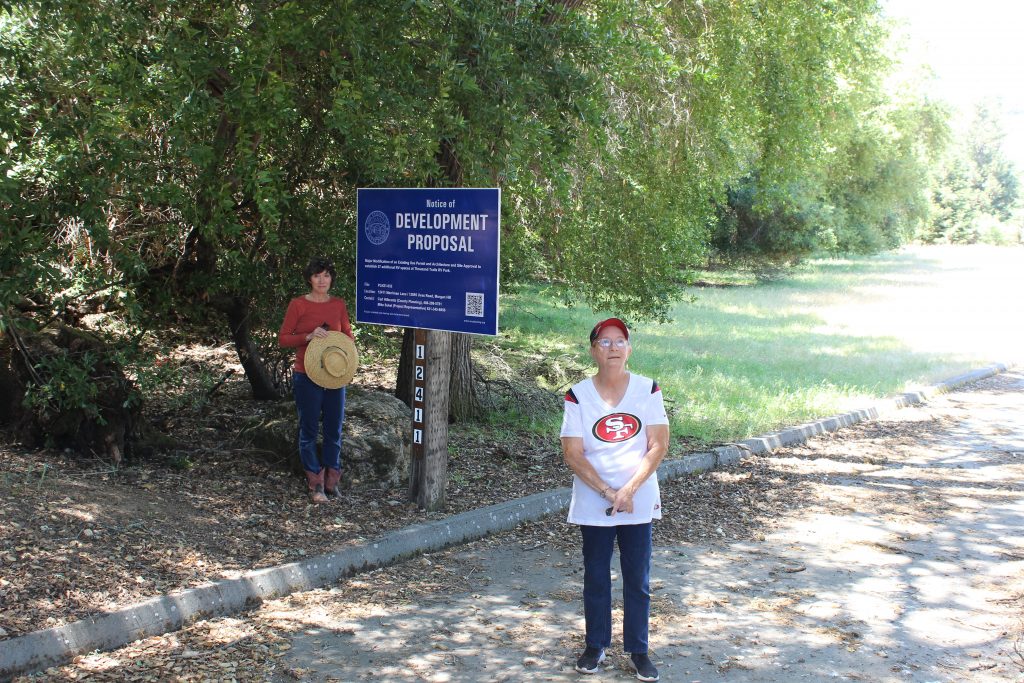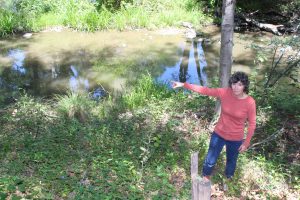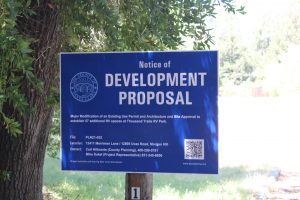County board of supervisors will decide the fate of project at May 25 meeting

Photo by Chad Mays From left: Pat Toombs and Swanee Edwards at the site of the proposed Thousand Trails RV resort park expansion.
By Chad Mays
A group of homeowners living near Morgan Hill’s Thousand Trails park have combined forces to fight a proposed expansion of the RV resort they say will harm the environment and their quality of life in their rural neighborhood off Watsonville Road.
Thousand Trails is owned and operated by the $12-billion Chicago-based Equity LifeStyle Properties. They plan to expand the 66-acre park by adding 54 RV sites to its current 339 sites on an adjacent 6.8-acre plot of land.

Photo by Chad Mays
Pat Toombs points to Uvas Creek, which opponents of the Thousand Trails RV Park expansion say will be negatively impacted.
Residents have expressed their concerns to Santa Clara County officials about the impact more RV guests could have on the rural environment, community safety and road traffic near their homes. They put a petition online that now has more than 400 signatures from people opposing the project.
The Santa Clara County Board of Supervisors plan May 25 to vote on a zoning amendment to change the current Recreational Vehicle Park General Plan.
If passed, the amended ordinance would allow RV parks to be developed only in rural zoning districts that are designated for higher intensity commercial uses.
Thousand Trails’ expansion would be taking place on a rural land located directly behind the home of Pat and Larry Toombs. Pat is leading the fight against the project as part of the neighborhood coalition calling itself Heritage Way Alliance Group.
“These types of expansions have no place in a rural environment,” Pat Toombs said.

Sign on edge of Thousand Trails property describing the proposed development of the RV park.
Photo by Chad Mays
At a May 10 outreach Zoom meeting facilitated by county staff, the homeowners and representatives from Equity LifeStyle Properties, a real estate investment trust, presented their views regarding the expansion.
Equity’s Director of Asset Management of California Mike Sukel and Equity Regional Vice President for California Jeff Kimes spoke about the positive reviews from Thousand Trail guests and also the company’s environmental stewardship.
More than a dozen homeowners, however, expressed their concerns about how the expansion might cause problems for the neighborhood. Their worries include home security and fire safety issues, increased traffic on narrow roads, loud noise from RV guests, flooding problems during storms, pollution to Uvas Creek and potential adverse effects from human sewage on well water. There were also concerns about property values dropping because of possible adverse conditions of the RV park.
 Members of the group said the area is zoned for one home per five acres. They also said construction would cause serious harm to the wildlife and ecology of the area and increased light pollution as well as noise would disturb wildlife. For example, the threatened steelhead trout in Uvas Creek would be put at risk if the water is polluted or drained.
Members of the group said the area is zoned for one home per five acres. They also said construction would cause serious harm to the wildlife and ecology of the area and increased light pollution as well as noise would disturb wildlife. For example, the threatened steelhead trout in Uvas Creek would be put at risk if the water is polluted or drained.
The proposed expansion may cause safety issues for residents and park guests if they have a long line of RVs and emergency vehicles crowding the narrow roads during a fire or other emergencies, Toombs said.
 County ordinance would require Merriman Lane, the narrow road that runs along the Toombs’ home and to the Thousand Trails property, would be widened to about 20 feet for emergency vehicles and RVs to get in and out of the park in an emergency. The expansion of the road would cut through private property including possibly a swimming pool.
County ordinance would require Merriman Lane, the narrow road that runs along the Toombs’ home and to the Thousand Trails property, would be widened to about 20 feet for emergency vehicles and RVs to get in and out of the park in an emergency. The expansion of the road would cut through private property including possibly a swimming pool.
Equity still needs to clarify to the neighbors how the road expansion will be done, Toombs said.
 “A lot of the questions we asked, they were unable to answer and that’s because they haven’t gotten far enough into this project to even know those answers,” she said.
“A lot of the questions we asked, they were unable to answer and that’s because they haven’t gotten far enough into this project to even know those answers,” she said.
Toombs has seen a wide variety of wildlife on her property and in the expansion property, which includes deer and mountain lions.
Equity spokesperson Jennifer Ludovice asked Morgan Hill Life to email questions regarding the expansion project and the impact on the neighborhood.
“We have a team of experienced professionals on staff to help manage the project and have enlisted the services of licensed civil engineers, traffic engineers and environmental consultants to ensure that all guidelines of Santa Clara County are followed throughout the duration of the project,” she replied.
Despite what the homeowners say about increased traffic, there will be mostly non-RV vehicles passing through on existing roads, she said.
“The addition of 54 sites, a 15 percent increase to the existing resort, is estimated to add only 68 trips per day . . . to traffic flow on existing access roads such as Monterey Road and U.S. 101,” she said. “Many of these trips will be in a vehicle other than an RV, as many guests have small tow vehicles they use for their local driving.”
If the county board approves the RV Ordinance Amendment, it would become law 30 days later. Asked if Equity might take legal action if the company was not allowed to move forward with the Thousand Trails expansion project, Ludovice said in her email response: “The use we are proposing is compliant with zoning for the parcel and we are pleased to provide information about our proposal for the county’s consideration. However, for specific information about county policy and procedures, you should check with the county.”
Toombs is hopeful the board will pass the RV Ordinance amendment. If the amendment is not passed, the Heritage Way Alliance Group will continue to fight the expansion project, she said.
Equity, however, holds that their project follows county standards in the approval process in compliance with its zoning, Ludovice said.
“There has been significant misinformation circulated about the project,” she said. “Morgan Hill RV Resort is a well-established property with more than a 40-year track record as a good neighbor.”
The environmental concerns are also addressed by Equity, she said. In recent years, Thousand Trails has made “significant investments in green initiatives” at the present resort in southwest Morgan Hill. These included solar energy, motion and dusk-to-dawn sensors for lighting, LED lighting, and smart thermostats.
“We believe being a good neighbor includes being mindful of our carbon footprint,” she said.
Equity will address issues at the Thousand Trails the neighbors have brought up in its guests behavior. Its resort rules include noise restrictions, Ludovice said.
“Our on-site management, including staff who are present 24 hours a day, ensure these rules are followed to allow for peaceful coexistence among our guests as well as with our neighbors,” she said.
Environmental stewardship in the expansion project is also vital to Equity, she said. This includes fish and wildlife care along the Uvas Creek bordering the Thousand Trails site.
Care for Uvas Creek has been taken into consideration in the planning of this project, Ludovice said.
“A 200-foot wide, 1.5-acre woodland area adjacent to Uvas Creek, comprising roughly 20 percent of the total area of the expansion project, has been reserved in the site plan design as a buffer zone which will remain undisturbed,” she said. “Proper drainage and runoff plans would be established and approved as part of the development.”
The county health department and state water board approved a “state-of-the-art” wastewater treatment system on the site, constructed outside of the floodplain, she said. It is designed and permitted to accommodate the new sites and improve treatment efficiency for the entire property. The Thousand Trails resort also maintains monitoring wells for regular groundwater testing, she said.
“The area will be well screened from neighbors and there is no reason to believe the additional sites will have any impact on neighboring property values,” she said.
Swanee Edwards, a Morgan Hill resident who lives several miles from the site, spoke against the expansion, describing how unincorporated areas of the South County do not have the same amenities as the rest of the county.
“Generally, the county has used San Martin as a place to put things the county doesn’t want in their backyard,” she said. “It’s kind of a dumping ground for the county.”
The San Martin community helped bring forward the rural residential zoning and the county agreed to use these zoning requirements, she said. A rural residential district permits residential development in certain limited unincorporated areas of the county designated by the general plan. Residential, agricultural and open space uses are the primary uses intended within the district.
“We need to maintain the rural residential zoning throughout the unincorporated county,” Edwards said. “These high-density RV parks need to be built where there is roadside zoning.”
Equity believes its expansion project offers benefits to South Valley, which would include hiring local vendors, contractors, suppliers and other businesses, Ludovice said.
“Once the project is completed, the resort will be able to welcome additional guests who are looking to visit our beautiful area, each of whom spends their travel dollars in local businesses,” Ludovice said. “The benefit of this will be appreciated by local business owners for decades. The county should also see an increase in transient occupancy tax revenue.”
The homeowners do not object to the RV park as it is presently configured, Toombs said.
“We are not objecting to any of the existing parks or the way they run themselves, or anything the way things are right now,” she said. “Our only objection is to the expansion of Thousand Trails.”
Chad Mays is a 2019 graduate of Sobrato High School who is now studying journalism as a junior at the University of Nebraska-Lincoln.






